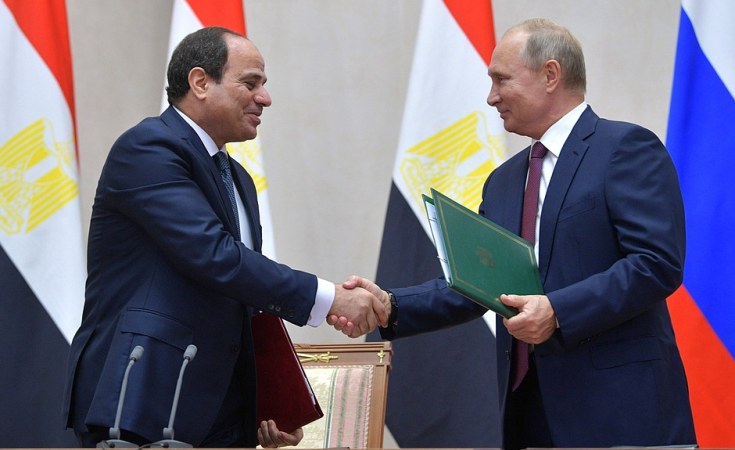The money, paid out over three years, is partly to help Egypt "move further away from Russian gas" and fund efforts to curb migration.
The European Union will provide Egypt with a funding package of €7.4 billion ($8.06 billion) from 2024-2027, the EU Commission announced on Sunday.
The funding is intended to assist Egypt in stabilizing its economy while reducing its dependence on Russian gas. It includes a grant to help address the flow of migrants from the region into Europe.
The deal includes €5 billion of macro-financial assistance, €1.8 billion of investments and €600 million in grants over the next three years to support Egypt's faltering economy.
European Commission President Ursula von der Leyen headed a delegation of several European leaders meeting President Abdel Fattah el-Sisi in Cairo.
Egypt's strategic importance
The agreement lifts the EU's relationship with Egypt to a "strategic partnership" aimed at boosting cooperation in renewable energy, trade, and security.
"With Egypt's political and economic weight and its strategic location in a very troubled neighborhood, the importance of our relations will only increase over time," von der Leyen wrote on X, formerly Twitter."
El-Sissi's office said in a statement that the deal aims to achieve "a significant leap in cooperation and coordination between the two sides and to achieve common interests."
Egypt's economy, which is focused on expensive infrastructure mega-projects, has been hit hard by recent economic shocks.
The country is under political and economic pressure due to the ongoing conflict in Gaza. Fighting there has meant important income earners for Egypt, like tourism and shipping through the Suez Canal, have been throttled.
Earlier this month the International Monetary Fund (IMF) agreed to an $8 billion loan package after Cairo implemented a flexible exchange rate and raised interest rates.
That followed an announcement in February by Egyptian leaders that the United Arab Emirates would be investing €32 billion directly into the Egyptian economy, mostly via a construction project at Ras al-Hikma, a Mediterranean peninsula near the city of Alexandria.
EU concerned by migration flows
European governments have long been worried about the risk of instability in Egypt where economic adversity has pushed increasing numbers to migrate.
This is in addition to the 9 million migrants and refugees that the UN's International Organization for Migration has residing in the country.
A senior European Commission official said the deal includes steps on "security, counter-terrorism cooperation, and protection of borders, in particular the southern one" with Sudan.
It follows other controversial deals the EU has sealed in northern Africa, including Libya, Tunisia and Mauritania, to stem the flow of irregular migrants.
Italian Prime Minister Giorgia Meloni and Greek Prime Minister Kyriakos Mitsotakis, whose countries are front-line countries that receive the vast majority of migrants to Europe, joned Von Der Leyen on her Cairo trip.
The Greek government is especially worried about the increasing arrivals of migrants of Egyptian origin.
The UN Refugee Agency has already registered more than 1,000 people arriving on Greece's southernmost island, Gavdos, and neighboring Crete, via a new refugee route from Tobruk in Libya.
The EU will provide assistance to Egypt's government to fortify its borders.
US-based Human Rights Watch criticized what it labeled "the EU's cash-for-migration-control approach" that it said "strengthens authoritarian rulers while betraying human rights defenders, journalists, lawyers and activists whose work involves great personal risk."
lo/sms (AFP, dpa, Reuters)


